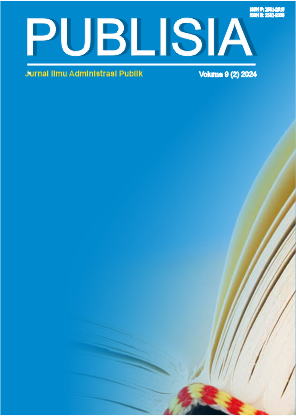Mekanisme Whistleblowing : Faktor Apa Yang Membuatnya Efektif?
DOI:
https://doi.org/10.26905/pjiap.v10i1.14813Keywords:
Fraud, Whistleblowing, Whistleblowing triangle, Transparansi, AkuntabilitasAbstract
Kasus fraud atau kecurangan telah menjadi masalah global yang memengaruhi berbagai sektor, termasuk sektor pemerintahan. Untuk mengatasi hal ini, mekanisme Whistleblowing dipandang sebagai langkah preventif yang dapat membantu mendeteksi dan mencegah tindak kecurangan. Penelitian ini bertujuan untuk menganalisis efektivitas mekanisme Whistleblowing di Pemerintah Kabupaten Klungkung dengan menggunakan kerangka kerja Whistleblowing triangle yang meliputi faktor peluang, tekanan, dan rasionalisasi. Data dikumpulkan melalui wawancara, observasi, dan analisis dokumen, kemudian dianalisis dengan bantuan perangkat lunak NVivo. Hasil penelitian menunjukkan bahwa meskipun mekanisme Whistleblowing telah diterapkan, masih ada tantangan signifikan dalam pelaporannya, terutama terkait motivasi pelapor dan kepercayaan terhadap sistem. Penelitian ini memberikan rekomendasi peningkatan sistem Whistleblowing untuk memperkuat transparansi dan akuntabilitas di sektor publik, khususnya di lingkungan Pemerintah Kabupaten Klungkung.Downloads
References
Book:
Bazeley, P., & Jackson, K. (2013). Qualitative Data Analysis with NVivo (2nd ed.). SAGE.
Bogdan, R. C., & Biklen, S. . (2007). Qualitative Research for Education: An Introduction to Theories and Methods, 5th Edition. Pearson.
Maxwell, J. A. (2013). Qualitative research design (3rd ed.). Sage.
Miles, M. B., & Huberman, A. M. (1994). Qualitative Data Analysis: A Sourcebook of New Methods. Sage Publicatio
Moleong. (2013). Metode Penelitian Kualitatif. PT Remaja Rosdakarya.
Olsen, W. (2004). Triangulatio in Social Research: Qualitative and Quantitative Methods Can Really be Mixed. Causeway Press.
Richards, L., & Morse, J. (2012). Readme first for a user’s guide to qualitative methods (3rd ed.). Sage.
Saldaña, J. (2013). The coding manual for qualitative researchers (2nd ed.). Sage.
Website document:
ACFE Indonesia Chapter. (2020). Survei Fraud Indonesia 2019.
Association of Certified Fraud Examiners. (2014). Report to The Nations on Occupational Fraud and Abuse 2014 Global Fraud Study.
Association of Certified Fraud Examiners. (2016). Report to The Nations on Occupational Fraud and Abuse 2016 Global Fraud Study.
Association of Certified Fraud Examiners. (2018). Report to The Nations on Occupational Fraud and Abuse 2018 Global Study.
Association of Certified Fraud Examiners. (2020). Report to The Nations on Occupational Fraud and Abuse 2020 Global Study.
Association of Certified Fraud Examiners. (2022). Occupational Fraud 2022: A Report To The Nations.
Association of Certified Fraud Examiners. (2024). Occupational Fraud 2024 : a Report to The Nations.
Komite Nasional Kebijakan Governance (KNKG). (2008). Pedoman Sistem Pelaporan Pelanggaran - SPP (Whistleblowing - WBS). www.governance-indonesia.com
Transparency International. (2023). Corruption Perceptions Index.
Journal article:
Brown, J. O., Hays, J., & Stuebs, M. T. (2016). Modeling Accountant Whistleblowing Intentions: Applying The Theory of Planned Behavior and The Fraud Triangle. Accounting and the Public Interest, 16(1), 28–56. https://doi.org/10.2308/apin-516
Charmaz, K. (2006). Constructing grounded theory. SAGE Culiberg, B., & MiheliÄ, K. K. (2016). The Evolution of Whistleblowing Studies: A Critical Review and Research Agenda. Journal of Business Ethics, 146(4), 787–803. https://doi.org/10.1007/s10551-016-3237-0
Gao, J., Greenberg, R., & Wong-On-Wing, B. (2015). Whistleblowing Intentions of Lower-Level Employees: The Effect of Reporting Channel, Bystanders, and Wrongdoer Power Status. Journal of Business Ethics, 126(1), 85–99. https://doi.org/10.1007/s10551-013-2008-4
Gao, L., & Brink, A. G. (2017). Whistleblowing Studies in Accounting Research: A Review of Experimental Studies on The Determinants of Whistleblowing. Journal of Accounting Literature, 38, 1–13. https://doi.org/10.1016/j.acclit.2017.05.001
Gunawan, B., Hanjani, A., & Humairoh, N. A. (2020). Meninjau Aspek Pencegahan Fraud: Studi Kasus di KPP Pratama Sukabumi. Jati: Jurnal Akuntansi Terapan Indonesia, 3(2), 94–104. https://doi.org/10.18196/jati.03023
Jones, A. E. (2014). Qualitative Data Analysis with NVivo. Journal of Education for Teaching, 40(2). https://doi.org/doi.org//10.1080/02607476.2013.866 .724
Latan, H., Ringle, C. M., & Jabbour, C. J. C. (2016). Whistleblowing Intentions Among Public Accountants in Indonesia: Testing for The Moderation Effects. Journal of Business Ethics, 152(2), 573–588. https://doi.org/10.1007/s10551-016-3318-0
Near, J. P., & Miceli, M. P. (1985). Organizational Dissidence: The Case of Whistle-Blowing*. In Human Relations, Social Indicators Research, and Journal of Applied Social Psychology.
Near, J. P., & Miceli, M. P. (2016). After the wrongdoing: What managers should know about Whistleblowing. Business Horizons, 59(1), 105–114. https://doi.org/10.1016/j.bushor.2015.09.007
O’Neill, M. M., Booth, S. R., & Lamb, J. T. (2018). Using NVivoTM for Literature Reviews: The Eight Step Pedagogy (N7+1). The Qualitative Report, 23(13), 21– 39
Nurhidayat, I., & Kusumasari, B. (2018). Strengthening The Effectiveness of Whistleblowing System A Study for The Implementation of Anti-Corruption Policy in Indonesia. Journal of Financial Crime, 25(1), 140–154. https://doi.org/10.1108/JFC-11-2016-0069
Pramono, A. J., & Aruzzi, M. I. (2023). Penerapan Whistleblowing system di Instansi Pemerintah sebagai inisiatif gerakan antikorupsi di Indonesia. Integritas: Jurnal Antikorupsi, 9(2), 195–212. https://doi.org/10.32697/integritas.v9i2.942
Schultz, D., & Harutyunyan, K. (2015). Combating corruption: The development of Whistleblowing laws in the United States, Europe, and Armenia. International Comparative Jurisprudence, 1(2), 87–97. https://doi.org/10.1016/j.icj.2015.12.005
Smaili, N. (2023). Building an ethical culture by improving conditions for Whistleblowing. Journal of Business Strategy, 44(1), 37–43. https://doi.org/10.1108/JBS-07-2021-0123
Smith, L. M. (1978). An evolving logic of participant observation, educational ethnography and other case studies. Dalam L. Shulman (Ed.), Review of Research in Education (6th ed.). Peacock
Triantoro, H. D., Utami, I., & Joseph, C. (2020). Whistleblowing System, Machiavellian Personality, Fraud Intention: An Experimental Study. Journal of Financial Crime, 27(1), 202–216. https://doi.org/10.1108/JFC-01-2019-0003
Winchester, C. L., & Salji, M. (2016). Writing a literature review. Journal of Clinical Urology, 9(5), 308–312. https://doi.org/10.1177/2051415816650133
Zakaria, M. (2015). Antecedent Factors of Whistleblowing in Organizations. Procedia Economics and Finance, 28, 230–234. https://doi.org/10.1016/s2212-5671(15)01104-1
Published
How to Cite
Issue
Section
License
Copyright (c) 2025 Publisia: Jurnal Ilmu Administrasi Publik

This work is licensed under a Creative Commons Attribution-ShareAlike 4.0 International License.
Authors who publish with this journal agree to the following terms:
- Copyright of the published articles will be transferred to the journal as the publisher of the manuscripts. Therefore, the author confirms that the copyright has been managed by the journal.
- Publisher of Publisia: Jurnal Ilmu Administrasi Publik University of Merdeka Malang.
- The copyright follows Creative Commons Attribution and share a like License (CC BY SA): This license allows to Share and copy and redistribute the material in any medium or format, Adaptative remix, transform, and build upon the material, for any purpose, even commercially.







